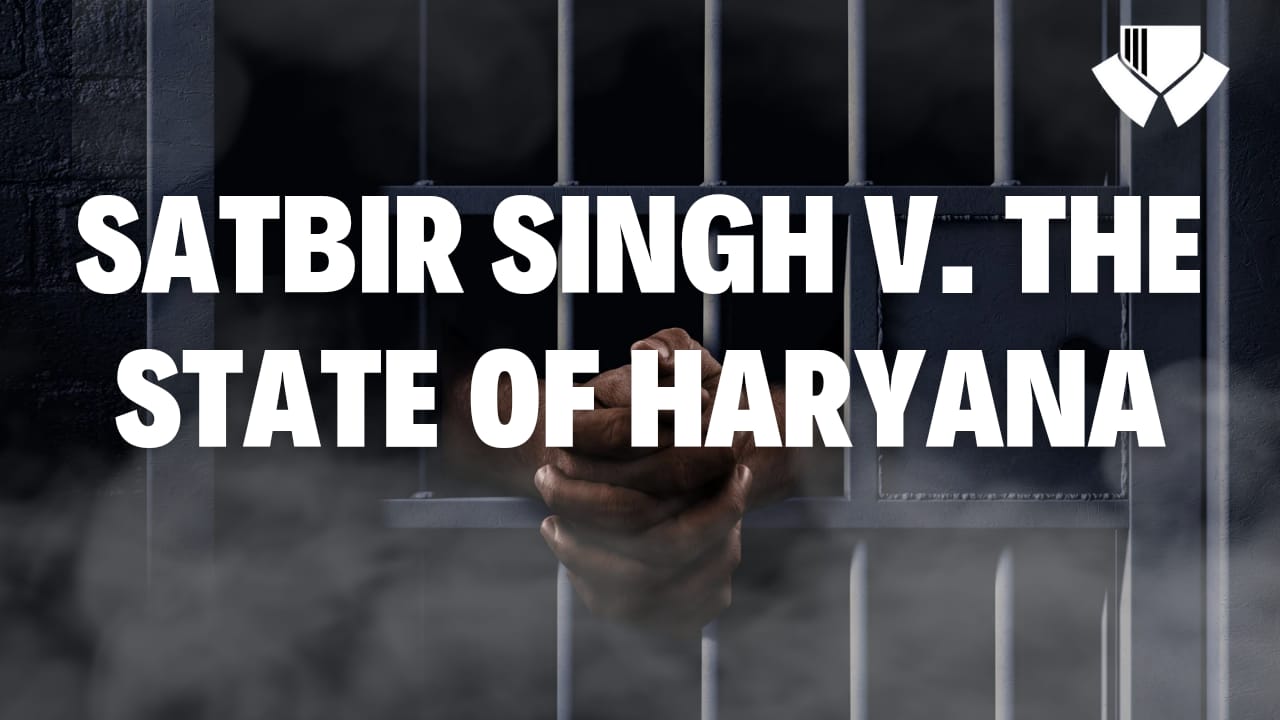This case analysis is done by Shivanshu Shivam a 1st year law student at Chanakya National Law University, Patna.
DATE OF THE CASE: 28/05/2021
APPELLANT: Satbir Singh
RESPONDENT: State Of Haryana
BENCH/JUDGE: Hon’ble The Justice, Surya Kant, Aniruddha Bose
LEGAL PROVISIONS: Sections 304−B and 306, IPC & Section 113−B, Evidence Act
Background
- This appeal is based on the judgment of the High Court of Punjab and Haryana, Chandigarh, in Appellate Appeal No. 3 1998 and No. 16 SB1998 dated 11 June 2008 issued by the High Court of Punjab and Haryana. Appeals dismissed by the applicants take precedence. And upheld the court’s conviction and judgment of December 11, 1997.
- The appellants were found guilty of the charges mentioned in sections 304-B and 306 IPC and found guilty of the offences punishable under section 304-B and punished to five years of detention in a court ruling dated December 11, 1997.
- The appellants made an application to the High Court to set aside the sentencing order. The High Court reviewed the disputed judgment dated 11/06/2008, upheld the Trial court’s order and rejected the plaintiffs’ appeal. Appellants filed their current appeal by special leave, challenging the competing findings of the courts below.
Issues
- Whether the Trial Court and the High Court, was correct in convicting the accused on the charge under Section 304B, IPC?
- Whether the Trial Court and the High Court was correct in convicting the accused on the charge under Section 306, IPC?
Petitioner’s Arguments
The appellants maintain that in this case, the probability of an accidental fire cannot be ruled out. Above all, the prosecution failed to prove that a dowry was called for. Finally, the prosecution failed to prove that the dowry demand, presuming it was made, was made close to the dead victim’s death.
Respondent‘s Arguments
The Respondent Country argued that the Appellate Parties were unable to present any evidence to justify the Court’s intervention in the competition findings of the lower courts. The attorney specifically emphasized that the suspected death of the deceased victim occurred within a year of the marriage. In addition, eyewitnesses point to the exact same dowry claim cases consistently.
Judgement
- After complying with Section 304−B, IPC, the court can now review the merits of the present case. It is clear that the arguments of the defence attorneys for the appellants must be refuted.
- Regarding the cause of death, the doctor (P.W.3) discovered the smell of kerosene on the body of the victim with 85% burns. Thus, in this case, the deceased victim died of burns. Since a burn-related death occurs within seven years of the marriage, it clearly satisfies the first two elements of the crime.
- Regarding the question of dowry, the evidence contained in the file shows that when the brother of the deceased (P.W.7) visited her at the matrimonial home after a month of marriage on Raksha Bandhan, the deceased revealed that the husband and her mother-in-law, tortured her on the grounds that she had not brought enough dowry. In addition, the defendants made specific requests for a scooter. It should be noted that just a month before her death, the deceased returned to her marital home. However, the accused is still pressing for a dowry for the deceased. The aforementioned truth was revealed by the deceased to her father when she visited him.
- The Trial Court and High Court found the witnesses to be reliable and based on them, concluded that the deceased had suffered atrocities shortly before her death because she had not brought enough dowry and the Supreme Court fully agreed with the above rulings of the lower courts.
- From the above analysis, it is clear that the prosecution succeeded in proving that the death of the deceased from burns took place within a year of marriage. It is further proof that shortly before her death, she was subjected to harassment and cruelty for asking for a dowry. Because of the components of Section 304-B, the IPC is satisfied, presupposes Section 113-B, Evidence Act applies to appellants who are found to have committed a particular offence can be found in Section 304-B of the IPC.
- The defendants did not submit any evidence in the file to prove that the death was accidental or unrelated to the defendants.
- The doctor’s testimony indicated that kerosene oil had been poured over the deceased person’s whole body. Therefore, the court rules out the probability of an accident.
- The prosecution did not present enough evidence to establish the crucial element of the deceased committing suicide. In this instance, the prosecution has been unable to prove that the death was the result of suicide. As a result, the court believes that this Court should intervene in the lower courts’ conviction of the appellants under Section 306 of the IPC.
- Due to the appellants’ failure to meet the burden of proof under Section 113B of the Evidence Act, this bench finds that the High Court and Trial Court weren’t mistaken in convicting the appellants under Section 304B of the IPC. However, the court is of the judgement that the offence under Section 306, IPC, is not made out after taking into consideration the facts and circumstances. The conviction and punishment under Section 306 of the IPC were thus overturned by the apex court.
Conclusion
The Honourable Supreme Court in this hearing makes many remarks against the social evil named Dowry which is a reason for many women’s deaths and this is that evil that destroyed many lives and not only of victims but all persons associated with her. In this judgement, the bench rightly took care of all facts and judgment of the Trial court and the High Court and the also bench remarked that it is not necessarily suicide as the victim was fully dipped in kerosene. This case set the precedent for future cases to be heard as in all cases were interpreted according to the situation.
Dowry should be ended in our society and if even one dowry death is happening then this should be considered as a failure of our laws and machinery as this evil is destroying the life many and leaving many traumatized for their lifetime as they face torture because of this. Thus, strict laws and fast hearing with rational execution can improve the situation.


